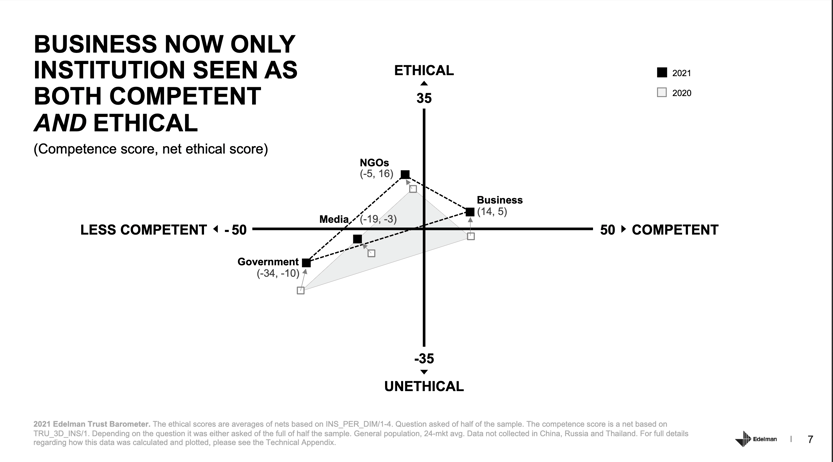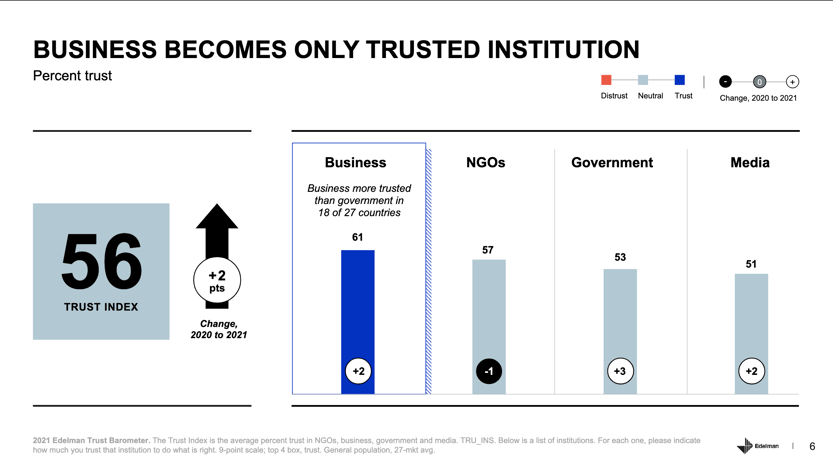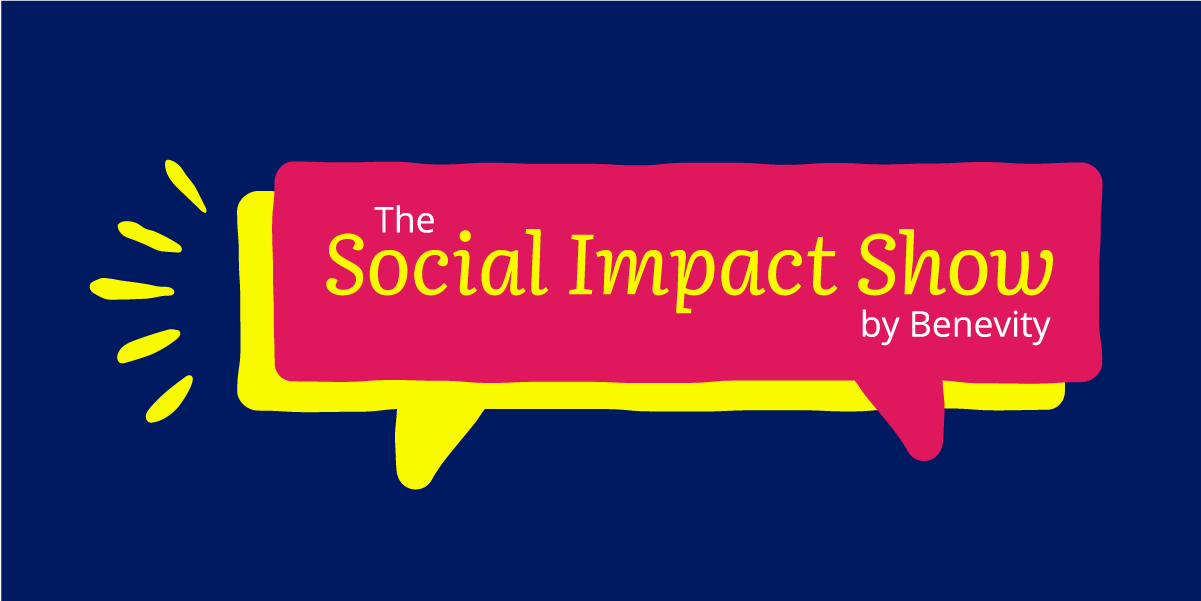What CSRs need to know from the 2021 Edelman Trust Barometer Report
In this episode, we discuss the Edelman Trust Barometer 2021 Report and what CSR professionals should know when developing their Corporate Social Responsibility strategies. We also explore why brands and businesses are leading the way above governments, media and NGO's. Finally, we also touch on why Corporate Purpose needs to be integrated in today's modern business.
Watch the episode:
Prefer to listen:
Read what we discussed:
Karl Yeh:
I'm joined by Margaret Bjork, director of goodness solutions with Benevity, and we're going to talk about the Edelman Trust Barometer, because there was one part of that that was really interesting.
But before we begin, how long has this Edelman Trust Barometer report been running, and why is it important for CSR professionals?
Why the Edelman Trust Barometer is important for CSR professionals?
Margaret Bjork: Gosh, [00:01:00] that's a great question.
I would have to find out the date of when it really started, but Edelman is the OG of this world, and they've been doing it a really long time, and really before purpose became main stage.
This is work that they've been doing for a long time and have been absolutely the trusted resource. And now, I think it's really having [00:01:30] a moment that the rest of the... It's not just CSR departments.
It's brand, it's marketing, it's finance with ESG.
I think we could probably give credit to Edelman being very effective of expanding this, understanding that this is not one department's J-O-B.
This is how good companies and good organizations run.
Karl Yeh:
The one thing that made this interesting to me this year was that, [00:02:00] in this report, it showed that brands or companies were rated the highest in terms of ethics and a competence over other entities like media, government, or NGOs, right?
NGOs, we'll put up a graph here where NGOs are deemed ethical, but they're not competent.

And then media and then government, they rank really low. [00:02:30]
The political environment probably, over the last several years and growing, has probably helped contribute to those perceptions as well.
But it's interesting that the brands or the companies are going to be the ones that people perceive are leading the way.
And one thing I found in the report too, who do you trust most for information, I found that my employer rated the highest out of everybody else, which I find very, very telling, especially in 2021.
Margaret Bjork:
[00:03:00] Yeah, I think that's really interesting.
I think when we think about our employer being the most trusted, we probably need to thank a lot of people who've done a lot of work over the years to really highlight the power and the value of good leadership, a lot of the promotions.
And the people that are getting these important seats are starting [00:03:30] to understand more and more the stakeholder mentality, and I think they're just getting much better at telling that story as well.
I think where companies really are doing a good job, and particularly with 2021, is that employees and companies, I think, really desperately need each other right now.
Employers asked us all to go home and work from home, [00:05:00] and we did it.
We needed our employers to keep us employed during a really scary time, so I think we both understood that we both had some power in that relationship, and that, I think, is really helpful.
That's obviously not the case everywhere, and probably very different depending on what kind of job that you have, but I think that we trust that our employers are going to keep us safe, because they have [00:05:30] to.
If they don't keep us safe, we can't come to work, and we're not going to work there anymore.
Especially pre-COVID, the economy was so good that you really could make a switch in your job that quickly. I would argue that's not the case anymore, but they desperately need us to stay right now, too. I think that power is a nice shared power.
Karl Yeh:
In terms of being in the world of CSR and CSR professionals, [00:06:00] what are some things that this perception of the brands being that ethical and competent group, as a CSR professional, how would you position your organization to take advantage of that?
How to push your business to be ethical leaders?
Margaret Bjork:
Well, I would say that it needs to be real. It needs to be real, it needs to be authentic.
I [00:06:30] think the CEO Roundtable has just done an excellent job of... Again, we talked about it in one of the other video recording of having your influencers, having people that you listen to.
You look at who's on that CEO Roundtable, and you're like, "Holy smokes.
These are the companies I know. These are the CEOs I know. Oh my gosh. They have Corie Barry. I have so much respect for her. Oh my gosh, there's Rockwell Automation."
Again, we can see ourselves. I don't really see myself as a CEO, but maybe one day.
But I [00:07:00] think we can see that these are companies that we like and we respect, and they are all saying, "Hey, our stakeholders matter."
And by stakeholders, I mean our employees, our communities, our customers, as well as our stockholders.
Now, they're really starting to come out in addition with Larry Fink, who comes from this macro level, but I think the CEO Roundtable's really coming with some tangible advice of [00:07:30] what good looks like, and I think their companies are doing it really well.
These are companies that are promoting more people, they have diverse ERGs.
Many of them are being accountable that they need to do more, and that they haven't made success in some places. They're being transparent with their sustainability.
They have employee giving and volunteering programs. They're celebrating awareness days and inviting employees [00:08:00] to express who they are and be their best self.
Those are the things that I think we see, and I think that makes a good company.
Karl Yeh:
I remember I read an article where Tim Cook from Apple was saying how executive compensation or bonuses were not necessarily just tied to performance of the company, but relating to ESG goals as well.
That was really interesting to see some [00:08:30] of the things that we care about, the CSRs care about. We're starting to see that permeate, not just into run campaigns or so on, but it's tied into the actual structure of the company, too.
Margaret Bjork:
I think that's right, Karl, because I think that is really a professionalism of this. I think, oftentimes, people have thought in the past about CSR and purpose and goodness like, "Oh, it's nice to have, [00:09:00] it's good intentions.
Oh, that department takes care of it." But I think what we're really seeing is that it needs to be embedded in all areas of the business.
Really great on Tim Cook for using their platform to say, "You know what?" I think people would argue Apple is a really good company, but they could be better.
I think we all could be better in raising equity for all. [00:09:30]
They're using the levers that they've used in the past to see other behavior to say, "You know what? This is just as important as these other corporate goals, these other OKRs, and we're going to start to tie executive compensation to it."
I think it is.
It's really a professionalism, putting those professional goals around something that is very important to people.
Karl Yeh:
Now, going back to that report. I [00:10:00] think, over the past several years, there's been a decline in trust with several different organizations, and with an increase in trust with businesses, too. I hope I'm getting that right.

That's what I've seen, but I think, to me, it's also a great opportunity.
If your organization is authentically doing some good things, it's [00:10:30] a great way to really showcase your values and your perspectives, right?
It's not enough to be like, "Here's our mission statement, here's our values." But if you're actually living and breathing that, if your organization does that, I think it's a great way to promote, right?
Then that ties into... It's like, "Hey, I trust brands. I trust this company to do some really good things."
Now, it's a great way to tie that in and really show that you're doing that kind [00:11:00] of stuff.
Why businesses must walk the walk on Corporate Purpose
Margaret Bjork:
I agree.
For me, I think the tipping point on this was after Hurricane Harvey, and Walmart came out and said, "If you make a donation when you check out, we'll match it, and we'll send it to the Red Cross."
Again, at this time, I had worked with nonprofits for 15 years, very familiar with donation buttons on [00:11:30] nonprofits' website. I was like, "Yeah, you know what?
That would be even easier if I could just go where I'm already going, give $20, and P.S., it's not just $20. It's matched." If you've heard my other segments, you know I love a match.
I can't resist it. But it is incredibly effective.
And then I think back to this trust thing. I know, if I'm giving money to the Red Cross after Hurricane Harvey, my intention [00:12:00] is that money should be spent in the Houston area for those victims.
That's what I think is going to happen.
I also know it's $20. I'm not going to go make a restricted gift to American Red Cross.
I'm not going to bother them.
They got to go do their work. But I actually have a little bit more confidence that Walmart, if I gave that money, that Walmart knows that I want that money spent in the Texas area or on another hurricane, whether it was Maria in Puerto Rico.
This [00:12:30] is the intent of this gift, and I trust that Walmart has the relationship and the power, again, to say, "No, no, no. This is what we want that money to go to."
I think that's a little bit, too, of what we understand.
Yeah, I think we understand how power works. What was it? House of Cards and Scandal were eye-opening to regular people. I'm like, "Oh my gosh.
This is how it all works," which I hope is not 100% true.
But I think we do know that [00:13:00] companies like Walmart have a lot of influence, and I think they're a great example of a company who is using their influence to drive serious change, and they're doing that, and they've done an excellent job of that.
I really think it was since Katrina, was their turning point, and how much their brand has been elevated, and how much they're really leading the discussion around ESG, around workforce development, and in the benefits they're getting from that.
Karl Yeh:
[00:13:30] Do you have anything else to add in terms of our really quick discussion here on the Edelman report and opportunities for CSR professionals?
Margaret Bjork:
I just think it's a great time to go and get cross-functional.
I think, a lot of times, again, as CSR professionals, we think about impact.
We've thought about impact for 20 years.
We think about UN Sustainability Goals.
But this concept of ESG and this concept of what Larry Fink is doing and pushing out, [00:14:00] and Edelman, it's honestly new information to many, many key business people.
I want to go have a conversation with your CFO and say, "I think I could really help you with these ESG scores."
That's the lens that they're going to look through. And then I would say, "Go talk to your brand people. And let's not compete.
Let's not find out later that we have a consumer-facing donation drive that's not connected to an employee one." [00:14:30] I think it's a great opportunity to... I think purpose and CSR is the new black.
It is your moment.
Go to those meetings and be brave and say, "We want a seat at the table, and we can help you achieve the goals that you want, because we're the experts at it."
You've been doing this for a long time.
Karl Yeh:
If you want to learn more about scaling, growing, or developing your CSR programs, you've got to check out this playlist here, as we provide more tips and strategies.
Thank you very much for watching, and [00:15:00] we'll see you in our next episode.
About Margaret Bjork:
Margaret has worked to power good through technology for over 20 years. Starting as a practitioner in the nonprofit community, and then working for companies who provided the technology to nonprofits and corporations use to run their fundraising, employee engagement, HR, and digital marketing programs. Margaret helps her clients find ways to operationalize goodness so that it is easy and scalable to combine Profit and Purpose and create engaging programs for their employees, consumers, and communities.

